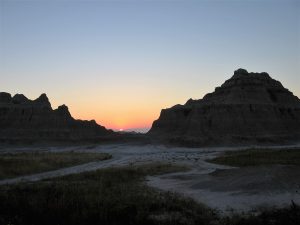 Day after day they pour forth speech; night after night they reveal knowledge. They have no speech, they use no words; no sound is heard from them. Yet their voice goes out into all the earth, their words to the ends of the world. (19:2-4b NIV).
Day after day they pour forth speech; night after night they reveal knowledge. They have no speech, they use no words; no sound is heard from them. Yet their voice goes out into all the earth, their words to the ends of the world. (19:2-4b NIV).
People like to gaze up at the sky and into the heavens above. Sharon and I live in a suburban area, and we rarely can see many stars. There are too many lights around us. At such times, we miss upstate New York. When we can be out in the country, we like to star gaze. I suspect you do, too. In these verses, David considered the revelation that God has made in nature, specifically, in the sun and the stars.
Day after day they pour forth speech…. David next entered into a more particular explanation of the principle stated in verse one. We might picture a storyteller starting at first light with his tale, continuing it until the sun sets, but then another storyteller comes on the scene to continue the same story! “They ‘pour forth’ or literally ‘bubble forth’ their information. As someone has rightly remarked, it is as though their eloquent testimony bubbled forth at every crack and cranny of the universe” (Leupold). Speech: David emphasizes that everyday the creation communicates with mankind about their Creator. God has a twenty-four hour “TV station or web page” that only broadcasts commercials—messages about his glory. The creation says to mankind, “Stop, listen to my voice, and think about what I am telling you about the glory of God.”
Night after night they reveal knowledge. The night is usually the time for rest, sleep, and the pursuit of pleasure. The creation, however, is always at work preaching the glory of God. What an advantage may be received by people from this preacher! Until recently, people were unable to know little about the universe around him during the daytime. Sometimes the moon is still visible early in the day, and there is the occasional morning star or supernova, but it is the night that reveals the immensity of the universe. It displays knowledge not easily received otherwise; even the most illiterate can look up and read a vast library regarding the glory of the Lord.
They have no speech, they use no words; no sound is heard from them. Since the Tower of Babel, mankind has been under the judgment of many different languages, which has hindered human progress and frustrated mankind’s pride. How difficult it can be to understand someone from another language! Yet God is not frustrated in communicating with people. His creation speaks to people of all languages, so that all are without excuse (Romans 1:20). Observe that there are no “innocent heathen”, but that all are responsible to God because of the message of creation. They all are able to hear the language that the heavens speak.
Yet their voice goes out into all the earth, their words to the ends of the world. Verse four is quoted in Romans 10:18, in that great passage about the sovereignty of God in the spread of the gospel (good news). No one will be able to say on that day of judgment that he or she never heard about the Creator, because the Lord has had his words about his glory and his work proclaimed to the ends of the world. But someone may object, “But this message tells nothing about the way of salvation! That doesn’t seem fair!” However, God is most just. Since they refuse to listen to the message of his glory and suppress it constantly (day after day… night after night), God cannot be blamed for not sending another message, the good news of his Son.
When we tell others the good news, we do not go among those who have never heard, but among those who refuse to listen—a hostile audience. Don’t be surprised when they will not listen to you. To turn someone from darkness to light requires the action of the Holy Spirit with God’s word. We can and should tell others the word, and at the same time, we must pray for the Holy Spirit to produce spiritual life as they hear the word. For whom are you praying?
Grace and peace, David
